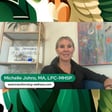Introduction to the Guardians of Hope Podcast
00:00:00
Speaker
Welcome to season three of the Guardians of Hope podcast. We are a community of parents, educators, health, legal, and tech experts dedicated to positively impacting children's lives. The thoughts and opinions of my guests are not my own. This is a platform for sharing. Okay. Welcome everyone.
The Rise in Family Detention and Separation
00:00:19
Speaker
In recent months, we witnessed a disturbing surge in family detention and separation. As of June 2025, there are 57,861 detainees in ICE facilities, a 51% increase from the previous year, pushing these facilities nearly 45% beyond capacity.
00:00:41
Speaker
More than 100 U.S. citizen children have been left stranded after their parents were detained or deported, creating what advocates are calling the new family separation crisis.
00:00:54
Speaker
Meanwhile, as many as 1,360 children remain unreunited with their parents six years after forced separation at the U.S. border.
Realities of Detention and Community Responses
00:01:05
Speaker
Today, we'll explore the inhumane realities families face during detention, the policies that can protect those wrongfully detained, and how communities can respond with sympathy and emotional intelligence when children in their neighborhoods are caught in this crisis.
00:01:24
Speaker
Joining us to discuss this is legislative attorney, Maria Mosefer, who has spent over 15 years crafting groundbreaking legislation centered on equity, halting dehumanization and institutional change.
Maria Mosefer on Policies for Equity and Inclusion
00:01:40
Speaker
you so much for being here. Thank you for having me and having this important conversation at this time. Yes, definitely. Why don't we start by you explaining what your professional background is and what the and the work that you do?
00:01:56
Speaker
sure so i have spent uh almost the last 20 years crafting legislation and advocating um i'm a attorney and i call it a legislative attorney right now because i've spent so much time just crafting legislation my areas of interest are conflict resolution and mediations and civil rights. And so um I come at it now from an angle of how can we create policies and change legislative code to be able to address issues of equity,
00:02:27
Speaker
inclusion, halting dehumanization ah policies, and be able to create the world that we want to see. And every aspect of our life is impacted by the legislation that's on point.
00:02:40
Speaker
And so we either have to counter the legislation that exists that's resulting in inefficient systems or unjust, inhumane systems, or create legislations ourselves to be able to counter those as alternatives.
Impact of ICE Detention Policies on Families
00:02:55
Speaker
rightly so, the way that you've started the conversation. I think the country is watching um the policy and the mode of operation and the mechanisms that are being used for ICE detentions and to be able to bring in individuals that have crossed the border illegally and also have criminal records.
00:03:16
Speaker
That is the overall policy and and intent stated. And we We are watching what that actually means on the ground and how it's being implemented. And I think that is where our focus needs to be.
Conditions in Detention Centers
00:03:31
Speaker
for sharing that with us, Maria. It is a very important topic ah to discuss right now So currently we're seeing ICE detention numbers at historic highs.
00:03:42
Speaker
From your work as an attorney, can you paint a picture of what these conditions actually mean for children and families? What are you hearing about from, what are you hearing from families about the physical and emotional toll of overcrowded detention facilities?
00:03:59
Speaker
So let me start off by saying that ICE attentions are not something that are new and family separation is something that is not new and it transcends political administrations as well. And I say that
Challenges Faced by Children and Families
00:04:12
Speaker
because we wanna be able to break the echo chamber, no matter what side of the aisle you are, our political affiliation and look at the policies and implementations of these policies objectively.
00:04:25
Speaker
So unfortunately, i will say this, I wish we had 365 access of elected officials and appointed officials that can go in and look at the facilities and see what is happening inside. That is one of um one of the major obstacles right now is that the information that we're getting are only based on people that have been released from detention.
00:04:50
Speaker
um we and family members that are able to speak on the phone with individuals inside. So there has not been the ability for elected officials to openly go in and and just you know do a surveillance or just do a check-in of what the conditions are.
00:05:05
Speaker
So that's already one information gap that we're having. And the the the necessity of that, I can't underscore, the necessity of being able to see for ourselves is so critical because we want to be able, as a society, to understand what's going on inside with taxpayer money to individuals that are on U.S. soil.
Legal Rights of U.S. Citizen Children
00:05:25
Speaker
What we have heard from individuals that have been released is lack of food, lack of water, lack of space, lack of bathroom use, lack of access to medication, lack of information as far as being able to communicate with your family members in a timely manner.
00:05:42
Speaker
It is overcrowded. There are no places to sleep. there People are sleeping on concrete floors. People are given, I'm sure you've seen images, aluminum blanket, and you know, those blankets that everyone sees.
00:05:55
Speaker
um And then the those are the conditions inside, right? And those access points are very, very critical because we are really looking at what information we can garner to create patterns.
00:06:07
Speaker
and see systematic conditions. And what we are seeing again and again is that from the reports that are coming out, that it is a matter of just lack of sanitary, healthy conditions for individuals that do need medications that are dire, um that may have mental health issues, that may be physically weak, ah maybe older in age,
00:06:31
Speaker
all of these conditions are being addressed um ah as far as inside the facility. Outside the facility, and I think your question is specifically about children, we have seen multiple cases where children have been left on the side of the road, which has happened in Illinois,
00:06:50
Speaker
or and the or the children have left been left not understanding where their parent is. They're in school
Communication Barriers and Collective Trauma
00:06:56
Speaker
and the parent is taken away. um and I would argue that that is separation, whether you're left on the side of the road so you know to just be like, what are we supposed to do now?
00:07:07
Speaker
or you're left at school and when you come home, your your parent is not there. um So we have seen a lack of proper training and proper process of what you do when you're detaining individuals that are with children and how children are watching this unfold in front of them who have no fault of their own are caught in this situation.
00:07:32
Speaker
So recent reporting has documented more than a hundred u s citizen children left stranded after ice is detained or deported their parents, children who have ended up in the care of relatives, neighbors, coworkers, or even strangers.
00:07:48
Speaker
This is being called the new family separation crisis for my research. What legal protections should exist, but are failing these families right now? Well,
00:08:00
Speaker
I think to add to that, these US citizens, children that but ah are ah that are separated, their situation is analogous to US citizens that are detained.
00:08:11
Speaker
And as we know, u s citizens have rights. They have a right to due process. They have a right to privacy. They have a fourth and first amendment rights. um And all of these situations that have occurred, have occurred majority of them without any warrant, without any identification.
00:08:31
Speaker
And so what you have is children being separated from their family, some of them U.S. citizens. And I mean, even the parents are U.S. citizens and detained um and then released later.
00:08:43
Speaker
um But the children themselves as U.S. citizens have a right to be able to say that they need protection and they need privacy. Unfortunately,
00:08:54
Speaker
the person that they're taking is not the child, right? The person that they're taking is the adult in the situation and that's what makes it very, very difficult. And so what you'll see is that you'll see a formula of how to be able to violate constitutional principles of the Fourth Amendment, the right to warrant, the right to habeas corpus, to be able to do what they need to do as far as ICE agents. And that is you know the message that they've been sent.
00:09:24
Speaker
And I only come to that conclusion because we've seen it on the ground. And so for these children, you're correct. A lot of them are um cared for by their family members or relatives or their neighbors.
00:09:38
Speaker
And a lot of these children don't know what the answer is because many of the times these neighbors and these family members have a hard time even getting in touch with the parent that's been taken. So you
Inhumane ICE Procedures and Need for Change
00:09:48
Speaker
need to go through a process to be able to speak to the immigration attorney that you know,
00:09:53
Speaker
that you know that you have in your network to be able to find out where your certain individual is. Now you've probably seen in a lot of these cases, if you see the videos, cause everyone has a right to record. So I want to make it very, very clear that this is the only way we're getting information.
00:10:09
Speaker
um in addition to those being released after detention. But you will see a lot of people that are being taken and the people that are recording them ask them of their name, you know, of where they live to be able to tell the family members, because it's been that difficult for family members to find out where they are. And there was actually a incident in Chicago where a daughter came looking for her mother because she had not come home and saw a few journalists at the scene of where the detention occurred where the detainment occurred and was able to look at a camera of a video recording and said oh my goodness this is my mother so that lack of information the ability to contact your own family just imagine the children don't know when the parents are coming and the the family members that are taking care of the children do not have any ability to say
00:11:00
Speaker
he or she is coming back in a couple days, right? Or we know where they are and we're working through the process. We don't even know that. And so those pieces of information have have really caused collective trauma.
00:11:14
Speaker
I would say collective trauma on communities as a whole, on neighbors, on individuals, on parents trying to drop their kids off at school. If if I may share some incidents for for your audience and maybe...
00:11:26
Speaker
others have seen it, if that's okay. um But there is, you know, and you'll see these videos, but you'll see a video of ah of a father that is taking a daughter to Montessori school and he's in the car and he, and the ICE agents approach him and he tries to tell them in a calm way, not to scare his daughter that's in a car seat.
00:11:48
Speaker
She's that young and try to communicate and say, okay, okay, I'm going to roll down the window. Hold on. And you hear the daughter say, what's going on? What's going on? And he kind of just plays it off like a jokey way to kind of calm her down. Oh no, it's just a man. You know, I'm going answer his question in the process of calming her down and him looking for his, whatever ID he has. And then wanting to now effectively roll down the window, his window gets smashed.
00:12:16
Speaker
Yeah. So just want your audience members to think about that, no matter where you are on the political spectrum here, that there's a young girl watching her dad in a car who is essentially her Superman, you know, and, uh, she's right about to enter school and the window gets broken and what that message is to that young girl. And he gets dragged out.
00:12:41
Speaker
Right. And what will be resolved of whether his he is illegal or legal, whether he has a criminal record, whether he's a US citizen, whether he's been wrongly identified, whether this is a mistake, none of that is gonna be resolved outside the car.
Erosion of Constitutional Rights
00:12:57
Speaker
All of that is going to be resolved after he goes into detention, his lawyer accesses him and there's a process and there's a conversation. But what about that middle part right there?
00:13:08
Speaker
What about that middle part? And so I always say that it's not about legalities alone. You know, I'm against people being here illegally. Absolutely. There are people who should follow the law and we understand the rule of law and people who are criminals should absolutely be deported with serious and violent crimes and people that are illegal have a process. And if they haven't gone through a process that needs to be a discussion on, on how to get them safe and, and how to be able to put
00:13:39
Speaker
give them a path where they can um they can be here legally if they've been contributing to society without any criminal records. All those are nuances and we can discuss those. But what we really need to discuss is the dehumanizing ah procedures that that are humiliating, that are terrorizing, that are traumatic.
00:14:00
Speaker
And if it's difficult for us because we sit on different opinions on this issue, let's just think about the children then. Because we can definitely agree that the children watching this happen on the behalf of you know our nation, what message is that telling children of who we are as a nation?
00:14:20
Speaker
And you know I just want to share another another incident as well, where there was a young mother taking her children to school, and I believe they were eight and six, very young, and she was very scared. I'm not sure what her legal status was, because again, we're talking about the mode of operation.
00:14:38
Speaker
And she was driving under the speed limit, but she was taking her children to school and they stopped her and, you know, arrested her right there. And so what are those two children watching in real time? They may have no concept of what is happening and they're watching their mother being arrested on their way to school. So that has traumatized them for life of where they belong in this country. They could be U.S. citizens. We don't know.
00:15:04
Speaker
Right. But even they're not U.S. citizens, what message is that are you giving to a human being of what the protocol policies and procedures are of our nation and how we treat people?
00:15:16
Speaker
and treat of all things, children that don't have a role on the legalities or criminalities of all of this. Right, these are minors. Right, right. Absolutely. And I, and I think that's why, like, when we think about how to come in the middle of how to solve this problem of family separation and be able to articulate a way where people are opposing the need for, for, um, transforming the way things are done right now.
00:15:47
Speaker
we have to think about it from the the perspectives of the most vulnerable um that have no stake in the game other than safety, other than safety. And how do we treat children in this manner? Because that is the beginning point for us to start this conversation because then it will go into young women or students or or or adults that were brought that were brought here when they were six and had no idea, right? And now they've lived their whole life and they've been going through these processes.
00:16:17
Speaker
And I wanna add something else if if I can also about courtrooms. So I'm sure that people have seen videos of individuals going in and then the judge say, and you know, for their routine checkups and they get a notice to show up to court to immigration courts and their case is dismissed. And I think there's a lot of confusion for people because if you don't know the process, they're not really understanding what's happening.
00:16:42
Speaker
But the case is dismissed, meaning, you know, you're fine. The case is dismissed. So now the person thinks, oh, everything is resolved because I've been coming to these check ins for years, for 12, 13 years. And I've been trying to do everything and I've been paying taxes and going to work and contributing. I have no criminal record.
00:16:58
Speaker
And this person leaves. the chambers, the judge's chambers, and right there, they are arrested. And so the reason is because if you don't, if your case is dismissed, you have no prolonging legal procedure or process. So you have no reason to be here.
00:17:14
Speaker
And so that decision is made with, with a complete surprise. Right. And so the question is, do these individuals have rights and absolutely United States, you have a right to due process.
00:17:27
Speaker
you have ah You have constitutional protections if you're US citizen, but you have a right to due process and and the right to habeas corpus no matter who you are, US citizen or not. And that is because
Impact on U.S. Citizens and Systemic Failures
00:17:38
Speaker
we don't just round people up because ah we feel like it or they or they they look like they are supposed to be criminals.
00:17:47
Speaker
ah Because that's a slippery slope. And I want to state this as well, because there was some confusion on this. But there was a ruling by the Supreme Court, which is very controversial. And and i and i I find it very problematic.
00:17:59
Speaker
And that is that the phrase reasonable suspicion is used to be able to allow ICE agents to observe individuals and say, this person looks like they may be illegal.
00:18:12
Speaker
So let's stop them and question them and ask them for their papers. Right. So I just want to say how that has happened. this And we've seen this before. This happened after nine eleven because what we saw in the Patriot Act is that probable cause after 9-11 was replaced by reasonable suspicion.
00:18:29
Speaker
and so we saw this the kind of eroding of constitutional protections. And so we're seeing it again. And the question would arise, well, if they stop, if they stop you and you have your papers and you're a US citizen and you're fine, what's the big deal?
00:18:43
Speaker
Well, it's a big deal because you are basing your assumption based on their physical appearance or the language they speak, which is fundamentally so un-American because our nation is made up of so many different ethnicities, religions, and cultures.
00:18:58
Speaker
Um, And so that in itself is problematic, but let's think about what that ensues and the message that gives to that family or those children in the car or those people. I mean, there was a family out in Millennium Park in Chicago out on a day to look at the fountain and they were stopped because they looked illegal.
00:19:17
Speaker
right Just imagine you're out with your child and your husband and you're walking and you're watching everything on Sunday and you're enjoying and all of a sudden there's four agents that surround you and ask you for your papers. And that's
Community Support and Policy Advocacy
00:19:29
Speaker
how demoralizing is that?
00:19:31
Speaker
um And so on American, we are so much more than that. And so I think um we have to discuss these things on a very human level. And we also have to discuss these things based on efficiency and safety of not only the individuals that are being detained, but also the ICE agents.
00:19:49
Speaker
This is not helping the ICE agents either, right? Because you have individuals coming in wanting to do this job ah many of them motivated by feeling that they're doing the right thing. and they're And they're told, don't need to identify yourself. You can keep your mask on and you can ask them questions without having a warrant and you can come onto their window. And just imagine if you're in the car and you're with your family and someone that's unidentified and masked knocks on your window, what would you do?
00:20:20
Speaker
what would you do? And that's where a lot of that conflict happens and then it escalates. So I think knowing all the spokes on the wheel is very critical because we want to be able to get in ah and in a place where we can have proper policy that is effective and not politicized.
Legal Steps for Wrongful Detention
00:20:39
Speaker
So that's that's critical. Yeah. Mariette, thank you Now, with all of that said, what let's talk about some action plans or steps, right?
00:20:51
Speaker
What immediate steps should parents and families take if they or someone they know is wrongfully detained? What policies or legal mechanisms exist that people may not even know about?
00:21:04
Speaker
ah And what are some of the gaps in our current system that leave families vulnerable? So different questions there, but yeah, no, let me start out by saying, let's start out from, from the beginning.
00:21:16
Speaker
So let's say you are questioned. Let's say you are questioned. um You do not have to answer any questions if the person does not identify themselves. So First, they need to identify themselves. They have to show ID so it's very clear to you.
00:21:32
Speaker
And they have to tell you why they' why they are detaining you. So you have to ask, am I being detained and for what reason? You have a right to ask these questions. And I want to say this.
00:21:43
Speaker
um People are afraid to ask these questions and assert their rights because they feel like the person is going to become more aggressive. But we have seen that the more individuals that know their rights and are able to articulate strongly are able to um make it very clear to the agents that that they are someone that has knowledge and that they will have access to a lawyer. So don't sign anything without a lawyer.
00:22:10
Speaker
Don't answer any questions without a warrant and it should be a judicial warrant and have access to hotlines. So there's the National Immigration Law Center. If you go to their website, they have hotlines there.
00:22:22
Speaker
You can call numbers. Every state that you are in, actually, if you Google it, there's one for Illinois and I can share that with you for your audience. We can link it there, but there is one for Illinois. But every state has groups of immigration attorneys that ah that you can call.
00:22:38
Speaker
and you can share information about who has been detained, what their name is, when it happened, and so people can quickly find information. So that's very, very, very critical.
00:22:49
Speaker
But I think there's two steps here. It's what before you're detained and once you're detained. Both of them have two different ah categories. The other thing I want to say is that there's a different role from immigration attorney and there's a different role for a civil rights attorney.
00:23:04
Speaker
So a civil rights attorney will be able to help you if you've been wrongly detained, if you're right, if your rights were violated, your Fourth Amendment, your First Amendment. um and and And so that's who you would call when you're in that situation, you wanna address that issue. But if you have someone that's been detained or you're being detained, the immigration attorney is the one that's going to find out why you're being detained, what your status is. There's been cases where there have been US citizens that were waiting for their family members to bring birth certificates
00:23:35
Speaker
and passports to be able to prove that the person that's been detained is a US citizen. So if you if you want a lawyer to help you through that process, you definitely, definitely should. um The other thing is, i and and I know that this is alarming, but it's very necessary for people to know, there's a case where there was a woman that was detained and she was a US citizen and she actually had her passport. She was of Hispanic descent.
00:23:57
Speaker
She had her passport and the ICE agent said that the passport looked fake. Wow. So we don't know the process of training and she is a U S citizen. So it was not fake, but the process of training. So when you know that your first protocol should be to stay as calm as possible, you know, it's, it it really, really sucks because it's, it's frustrating because you have these rights and, and you feel like you've been in violated, but the best policy stay calm as possible, have your passports on you, have your paperwork on you.
00:24:29
Speaker
Be very clear in asking your questions. Make sure they have IDs. um Say I'm not going to answer any questions if you have IDs. Ask for a warrant. Ask for a judicial warrant. And answer ah questions only if you see those things. And you can say, I would like to see a lawyer. I will not answer any questions without a lawyer.
00:24:48
Speaker
ah You know, I was going to ask you if I should, you know, carry my passport around. um And you just answered that. Absolutely. yeah I'm a U.S. s citizen, but, you know, um we just have to carry more proof that we belong here, I guess.
00:25:06
Speaker
Yes. And it's a result specifically of the Supreme Court ruling that has allowed reasonable suspicion questions. And that category has been brought in. So, yes,
Empathetic Support for Affected Children
00:25:18
Speaker
Okay. Now let's talk again about children and and parents and community, because this is happening a lot closer and closer to a lot of our communities.
00:25:29
Speaker
When children in our neighborhoods are detained or separated from their parents um or families, what does an emotionally intelligent, empathetic response look like?
00:25:41
Speaker
How can we ah have our parents, teachers, neighbors, and community leaders practically support these children and their families beyond just feeling sympathy? How can they model what this looks like?
00:25:55
Speaker
Well, there's it's it's a very loaded question and it's the most important question because all of us can play this role. I think we have to, number one, let's start very basic and think about what the children are feeling, right?
00:26:11
Speaker
What the children are feeling. And that moment, the child feels that their protection is gone. Number one, the person that they respect, the person that they admire, and the person that protects them in some way in front of somebody is a criminal.
00:26:28
Speaker
That's what they have observed. And enough of a criminal to be snatched away from them. So when that is taken away, the the first note is obviously to let them know that now you're with adults that are safe, that are not going to harm you. They're not going to hurt you.
00:26:45
Speaker
They're not snatching you from anything. Validate their emotion that they know, ah that you know that they are scared, that they have just seen their parents been taken. But then reaffirm, i would really ask, reaffirm the goodness of their parents.
00:27:04
Speaker
the goodness of their protector, because then they know that they're in a safe space and they know that these are people that know that I'm the, I'm, I'm a good guy. You know, I'm a good girl.
00:27:15
Speaker
You know, my my, my parents are good people. We're a good family. Right. And that I think is so, so critical because you don't want to strip, uh, the humanity from the, from the parents that in front of the child's eyes. And that's what these policies are doing. And that's what these actions are doing, which causes trauma, right? It makes you just feel like I'm i'm part of the bad team.
00:27:39
Speaker
That's not the message at all. We want any child to understand. So I think an empathetic, emotionally intelligent adult should perk them up should perk up their family, should perk up their father, perk up their mother, you know, and say, she loves you very much. She works so hard and you know, she, she's so great. And we're, we're going to figure this out. You know, we're, we're going to figure this out.
00:28:02
Speaker
And look, you're not going to be able to figure out how to stop the ICE detention and a deportation. You're not. but you are in process of a team of people that the child is surrounded by. That is understanding that you're going to work towards offense on this.
00:28:22
Speaker
And that makes the child feel like, okay, we have a team. We have a team of people. We have a team of teachers. We have a team of neighbors. You know, we have a team of lawyers. We have people that are on our side and that gives some peace and some release and some relief to a child.
00:28:38
Speaker
Because at that point, the child wants their parent back, period. But for that moment gone, you're not going to be able to fix that hole with legalities and procedures and processes and explanations.
00:28:52
Speaker
They just want to know if someone's on their side and that someone knows their dad and their mom the way that they do. Exactly.
Urgent Changes Needed in ICE Policies
00:29:00
Speaker
i have one more question for you. um and it's drawing on your extensive experience. What policy changes you believe are the most urgent to address this crisis and what gives you hope that we can create more humane systems?
00:29:20
Speaker
Number one, I think a lot of your audience may have seen this, but there were ah federal rulings for ah cameras to be put on the ICE agents and the federal agents.
00:29:33
Speaker
The response back was that there wasn't the possibility to be able to do that because they can get cameras and everybody. um i would reassert that they got a big chunk of financial support from the big, beautiful bill.
00:29:50
Speaker
that money should go towards cameras and should go towards cameras being on those agents very quickly. That's what I feel. Number one. Uh, and I believe that this will keep ice agents safe as well.
00:30:03
Speaker
Um, because they will have transparency, um, and the person that they're communicating with, um, will feel safe too. And then they will communicate with you in a way where they can respect what they're being asked.
00:30:18
Speaker
The other thing is the issue of, and this has come up multiple times, the issue of training and qualifications is key. What are the qualifications of these ICE agents? How young are they?
00:30:31
Speaker
From what we have seen it ah from the memos is that the qualifications are that you have to be a certain age and physically fit. i But these are high stakes conversations that, as you can see on the streets, are resulting in very hostile actions between the public and the ICE agents. And they have to be trained to be able to know how to deal with this.
00:30:51
Speaker
I don't even think now they know. But a lot of ICE agents in the beginning probably did not know when they were going into the streets of what they're going to be met with and what people think of them. Right. Based on whatever narrative they're hearing.
00:31:04
Speaker
So um I think it's critical to have have them do proper training on conflict resolution and de-escalation and also training on when there's children involved. We we spoke about this earlier, but how do you deal with that element? Right. What are what is the protocol? If the person has children, who do you call first to make sure that family members come in and pick up the children?
00:31:25
Speaker
And there are and this is a difficult situation because many family members will be like, well, now they're going to take me to what you have to think through that process. That's what nuances and policy means. Right. So what do you do when there's children involved?
00:31:38
Speaker
And third is ah the signing bonuses, the 50,000 to 40,000. What is very critical here is not the amount of money. It's the fact that when you detain someone, the issue doesn't that doesn't get resolved until the courts deal with this person.
00:31:54
Speaker
So the ICE agent is just responsible for detention, just for detaining them. So if you have someone who's already paid or is promised to be paid a certain amount, and then is out there doing their job and they receive the message that your job is just to detain based on reasonable suspicion, then it doesn't matter if they make a mistake, to be honest, right? Because there's no camera. These are the protocols. Let the courts deal with it.
00:32:17
Speaker
So I do think that the money and the incentive and when they're being, ah when they're, you know, how much they're getting based on the qualifications and training is key. And so if I may repeat myself, just to make myself very clear, ah cameras, I think will really help.
00:32:33
Speaker
Number two, training, especially in family separation and when children minors are involved. And third is the amount of money that's being given. ah does it correlate with the fact that training and qualifications are present?
00:32:48
Speaker
So we know that they are motivated by procedure and not motivated by the money and to quickly just detain people and and and get people out of cars and and detain them. I think that would really help.
How Citizens Can Advocate for Change
00:32:59
Speaker
Yeah. Maria, one quick thing. um What about citizens? What can we everyday citizens do to push for change? So I think that's tied to your question that I actually didn't properly answer. And I apologize for that, but thank you.
00:33:15
Speaker
And that is what makes me hopeful for the humane policies on this issue. What makes me hopeful is that people are recording. People are watching. And so we are able to collect information and see, and US citizens should absolutely voice their opinions on the violations of due process, whether it be writing, whether it be calling your legislators, right? That's very, very key.
00:33:41
Speaker
the calling of elected officials and writing op-eds and articulating your, um, your views and being able to have town halls or workshops where, you know, people will be vulnerable to be able to teach them about their due process rights and their constitutional rights.
00:33:59
Speaker
All us citizens can do that. And I would encourage everyone to step into that role and do as much as you can to provide information and safety. um And as far as your question about, I think this is important, what happens when U.S. s citizens are detained and then released?
00:34:16
Speaker
That's when the civil rights attorney steps in, by the way. So we have seen individuals obviously file lawsuits after They have been released. And there was an individual, I believe in California who was 79 year old man who recently just filed a lawsuit for $50 million dollars because he was just in the store and the ice agents came running, looking for somebody else and bumped into him, just pushed him out of the way. He wasn't even who they were looking for.
00:34:41
Speaker
And he fell to the ground. And then they tackled him when he was, he was like, wait, you're in my property running through my stuff. And he just pushed me to the ground. And then they tackled him again. and he was not even who they were looking for.
00:34:53
Speaker
So US citizens are filing lawsuits in this case. um And I think that's very important and and empowering for people to know. um We obviously want a situation where we don't have to go that far, but those rights are available.
Accessing Resources and Insights from Maria Mosefer
00:35:08
Speaker
are available. This is all good information to know, Maria. Is there a way anyone can ah reach out to you or find out more about you and your work?
00:35:19
Speaker
Yes, they can reach out to me. um I'll have my website on this link. And so there is a place where you can message me on there. And I'm also on Instagram, so you can ah reach out to me there as well.
00:35:34
Speaker
and that's really the best way to reach out. And I will be putting in sharing, if we can with the audience, the links to the different hotlines, ah because I think that is the most useful. The information that I would provide for anyone would be able to um make sure that they are directed to a hotline that's nearest their location where they can get information and where they can also have access to both immigration and civil rights attorneys.
00:36:01
Speaker
Perfect. Maria, this has been such an important conversation. So thank you for sharing your expertise, your knowledge.




















